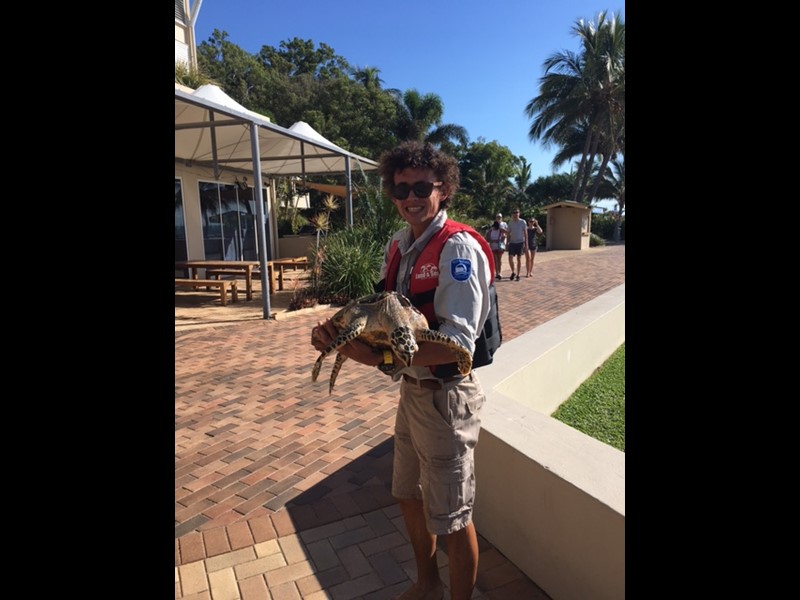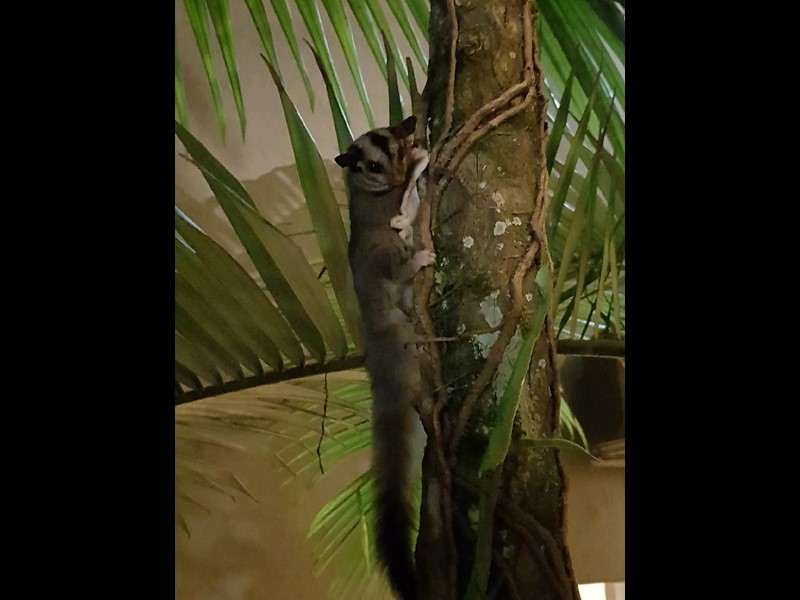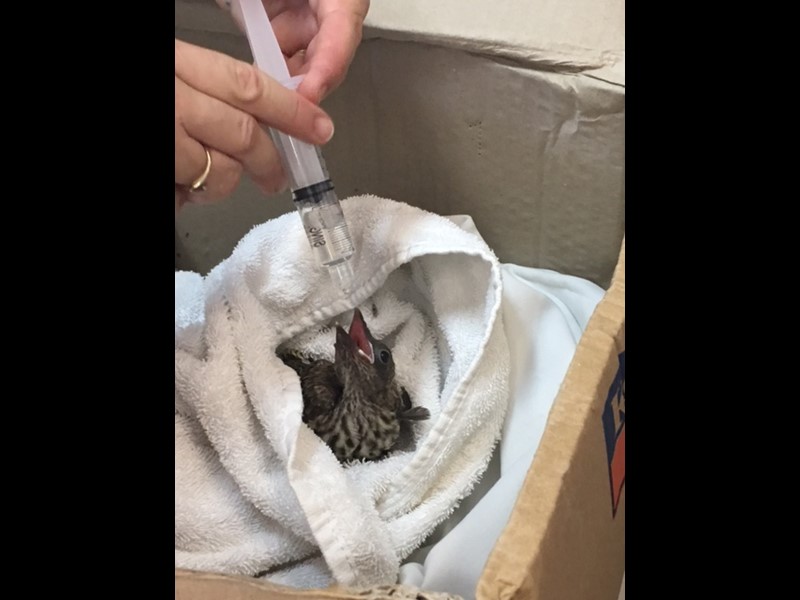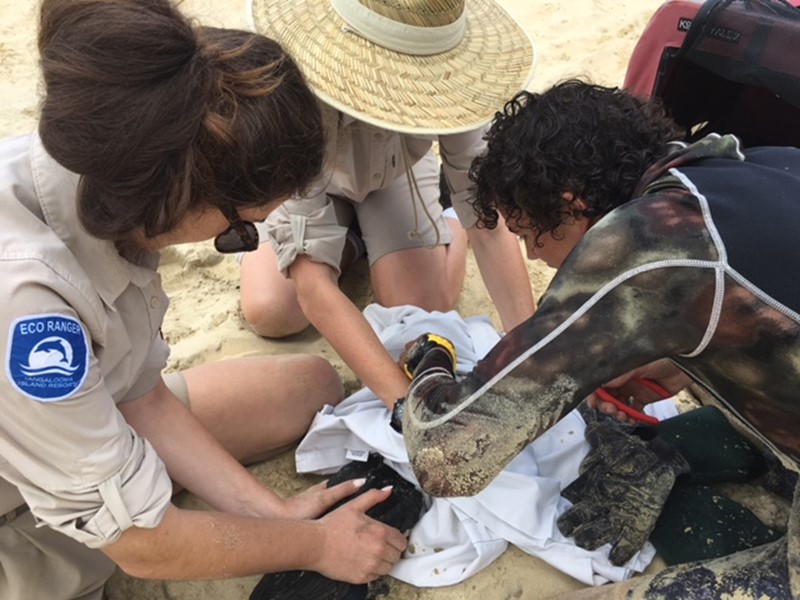Tangalooma Eco Rangers save the day!
An Eco Ranger's job is never done here at Tangalooma with animal rescue calls coming in all hours of the day and night. We are lucky enough to have a passionate team of four Eco Rangers who are all dedicated to looking after our wildlife and environment. The last three months has been a busy time for our Eco Rangers and very tough on our sea turtles, birds and other little critters on Moreton Island and Moreton Bay.
Only a few weeks ago as I was driving along the beach to go camping I found a small turtle on the beach that was clearly stressed as it was wrapped up in fishing line. The turtle had severe eye irritation and abrasion due to the fishing line constantly rubbing against its eye. I removed the fishing line and placed the turtle in the back of my car and drove it to the Eco Centre where I placed him in one of our turtle tubs to spend the rest of the night. The turtle was really lucky that it was not braided line as the turtle would have lost its eye. The turtle was sent to Australia Zoo to receive treatment.

Again, last week a group of campers found a mature Green sea turtle with injuries consistent to that of a boat strike near Moreton Island and the turtle was also sent by our Eco Rangers to Australia Zoo to receive veterinary care.
Not every rescue is as simple. Last week, a water sports skipper spotted a Hawksbill sea turtle (endangered species) making shallow short dives. The skipper called the Eco Rangers to report it. I quickly ran down to the beach and jumped on a jet ski to take a closer look at the turtle. The turtle dived down and then quickly surfaced, floating awkwardly by the rear. It appeared the turtle had gas trapped in its stomach, possibly due to some form of plastic ingestion. As the skipper maneuvered the jet ski towards the turtle, I was able to reach out and scoop the turtle up in my arms. Again we cared for the turtle overnight, until we could send him over to the Australia Zoo Rescue and Veterinary Centre for rehabilitation.
Unfortunately over 200 sea turtles wash up dead on Moreton Island every year. Forty percent of the turtles have ingested some form of plastic. Seventy percent of seabirds that wash up dead have also swallowed some form of plastic, so it is important to always throw our rubbish in the bin, particularly our plastics.
We also rescue little critters around the Island like Sugar gliders. The dolphin team was preparing to commence the dolphin feed last week, when a little injured Sugar Glider was found on the path by a guest! The poor little fellow appeared to have fallen out of a tree. At Tangalooma we have a healthy population of ‘gliders’ due to the amount and variation of native flowering plants we have around the resorts large and manicured grounds, and after a short week recovery, he was ready to be released. We released the little guy at the base of a large Coconut palm tree near where he had been found, where he quickly scurried up the tree.
The Sugar Glider made a few high pitch calls from the tree tops, and Eco Ranger Jess and I could hear one of his family members calling back to him and “Nutella” (yes we named him) was reunited once again with his family.

On Moreton Island we have 195 species of birds and with such an abundance and variation of species; we have seen a wide range of recues recently involving our feathered friends. Eco Ranger Jess found a young kookaburra on the ground that had accidentally flown into another rival group’s territory and it was feeling a bit worse for wear and we sent him off the island to receive veterinary treatment. When he recovered from his injuries, he was sent back to the resort to be released back to his family group. Laughing kookaburras are the largest member of the Kingfisher family but are not the only kingfisher species we see around the resort. A little Forest Kingfisher was recently rescued just north of the resort, as he had flown into a window. Eco Ranger Brendon gently picked him up and placed him in a box and sent him over to our Bird Rescue Careers.
The morning after a storm, a female Fig bird chick had fallen out of its nest. Staff members in the area heard the soft musical yelps for help, Eco Ranger Sue came to the rescue and picked up the little chick and placed him in a padded box. Eco Ranger Sue dripped some prepared electrolytes over its beak so it could be revived and re-nourished before it was sent over to the Bowden’s Bird Rescue Centre for rehabilitation.
With the increasing threats to our seabirds, it is very important to fish responsibly. Unfortunately our Pied Cormorants are in danger, as they are naturally curious and inquisitive birds, they can get themselves into trouble trying to eat the fishermen’s bait. There have been around a dozen bird rescues involving cormorants from the Tangalooma shipwrecks which have also kept our Eco Rangers busy. The Cormorants can be cheeky at times, but they do have big personalities.


Every single rescue is so different. One morning as the boat was departing from the jetty, a juvenile Cormorant was perched on the railing with a red whiting hook lodged in its lower jaw. This bird was calm and approachable it felt as if the bird was requesting help.
On another occasion a large dominant Cormorant was strutting along the beach with a six inch lure embedded in the side of his face, this reminded us of the movie ‘Happy Feet’ He was quite weary of humans after receiving the unwanted piercing, and it took a lot of convincing before he was close enough that I could rescue him and remove the lure. Eco Rangers Sue and Jess restrained him whilst I removed the lure. His eye had been severely injured, we had to send the Cormorant over to the Pelican Twins to receive veterinary care. Pelicans and cormorants do have relatively long lives, and in a perfect world, they can live to approx 25 years of age, unfortunately their biggest threat is humans.
These Bird rescues would not be possible if it wasn’t for our passionate and dedicated friends, Alf Bowden and the Pelican Rescue Twins (Bridgette and Paula) who care for the birds until they are strong enough to be released back into the wild. They have cared for thousands of birds over the years.
We are very appreciative of the continuous help of Alf Bowden, the Pelican Twins and the dedication of the vets and staff at Australia Zoo for the ongoing work that helps our birds and wildlife.
Fishing is very popular on the Island, but sometimes people do throw their discarded fishing line into the water, so I decided to do a clean up dive to remove the debris in the area and quickly filled a bag with discarded fishing line.
We can help protect our marine creatures in everyday life by using reusable shopping bags, reusable coffee cups (some cafés even give you a discount) and reusable drink bottles too. Take3forTheSea is a great clean beach initiative, encouraging people to pick up at least 3 pieces of rubbish whenever they go for a walk on the beach and with everyone’s help, we can make the a big difference!